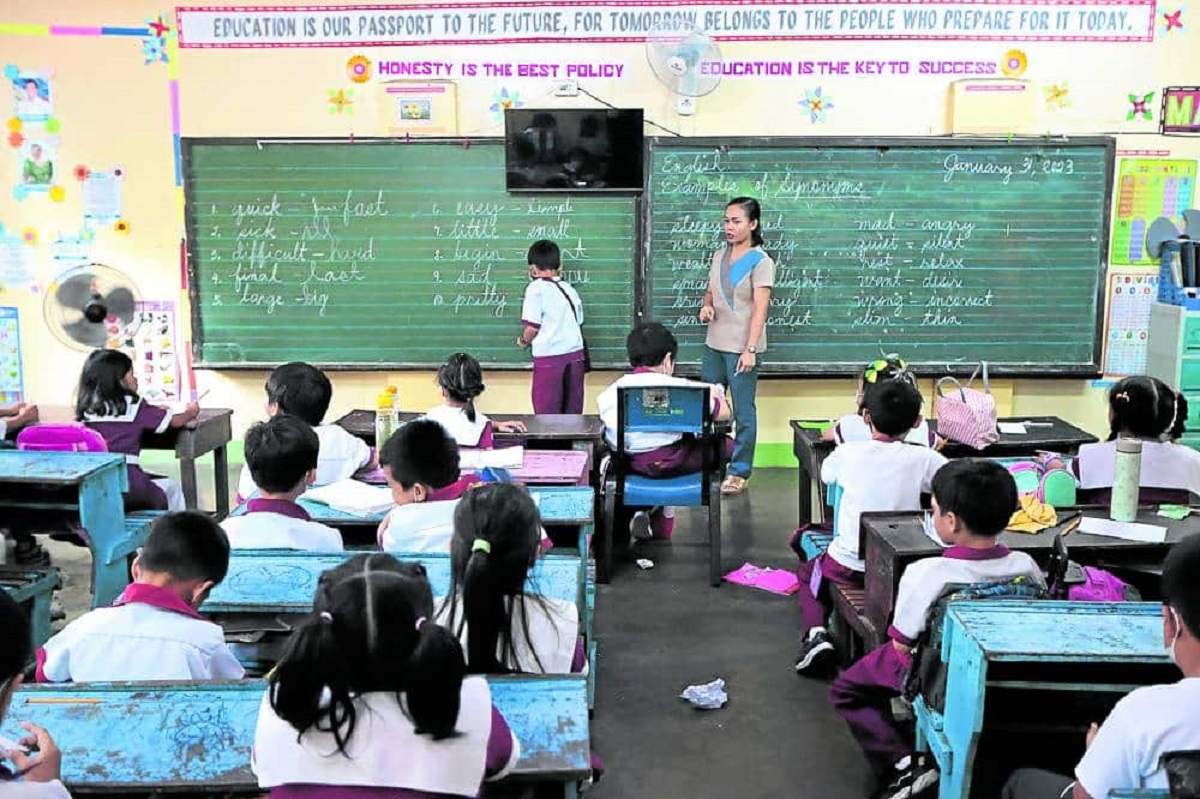
In this Jan. 31, 2023, photo, school teacher Maribeth DS Diaz holds an English class for her Grade 2 pupils in San Francisco Elementary School in Quezon City —Grig C. Montegrande
MANILA, Philippines — The Department of Education (DepEd) is keeping a close watch on reports of public school teachers leaving for job opportunities abroad, thereby increasing the teacher shortage in the country.
In that regard, Education Secretary Juan Edgardo Angara noted the newly established Cabinet cluster on education that President Ferdinand Marcos Jr. himself announced on Tuesday.
“I’ve greenlit the creation of an Education Cluster to develop a common agenda, ensuring that the Department of Education, Commission on Higher Education (CHEd) and the Technical Education and Skills Development Authority (Tesda) unite to close learning gaps and drive much-needed reforms in our education system,” the President said on his Facebook account, following a sectoral meeting at Malacañang on Tuesday morning.
READ: Filipino teachers migrating abroad amid low pay, says ACT
Angara said Marcos understood the urgency of addressing the “very deep-seated problems” in the education sector.
“He knows an Education Cluster is needed. But he doesn’t want to stop with the cluster because it is just a coordinating mechanism,” the DepEd chief said in a Palace press briefing later on Tuesday.
‘Study tours’
While he did not cite data on the exodus of teachers, Angara noted that “the destinations do not involve the [United States] but other countries as well, so we will definitely pay close attention to this by looking at the factors that make the teachers leave.”
“It’s a real problem. I have received reports that many schools overseas invite our teachers for so-called study tours. The problem with these tours, however, is that many of the invited teachers no longer come back,” he added.
From 2011 to 2017, around 1,500 teachers left the country annually to work abroad, according to the Philippine Overseas Employment Administration. Many of these teachers moved to China, Saudi Arabia, Singapore, Japan and Thailand.
According to DepEd, the overall number of public school teachers as of the school year 2020-2021 is 876,842. Of that total, 514,099 are grade school teachers, 288,687 teach junior high school, and 74,056 teach senior high.
To reach the ideal class size of 35 students, DepEd should hire 25,000 teachers annually until 2028, according to Alliance of Concerned Teachers chair Vladimer Quetua.
These are among the factors that the new Education Cluster will tackle, Angara said.
The cluster will be composed of the DepEd, CHEd, Tesda, the Department of Labor and Employment, and the Department of Budget and Management. The Department of Social Welfare and Development will be part of the cluster’s technical working groups.
It was the Second Congressional Commission on Education (Edcom II) that proposed the cluster.
“All of the agencies are doing their respective jobs, but they do it independent of one another with no mechanism of coordination, of making sure that the plans come together and they deliver an integrated system of education,” Edcom II executive director Karol Mark Yee said.
PH students among loneliest
Angara said the cluster would also tackle the country’s need for guidance counselors, as he cited a study by the Programme for International Student Assessment showing that the Philippines has the highest prevalence of bullying in schools.
Filipino students are also rated as among the loneliest, the DepEd chief said.
“Based on the Anti-Bullying Act, this matter is the concern of guidance counselors. But in DepEd, we have about 5,000 vacant positions for guidance counselors but there are no takers,” he said.
The Philippine Business for Education hailed the creation of the cluster, saying, “We believe this Cabinet cluster and the appointment of an education czar can set the motion for the much-needed long-term vision and plan for education and human capital development of the country.” —with reports from Dempsey Reyes and Inquirer Research